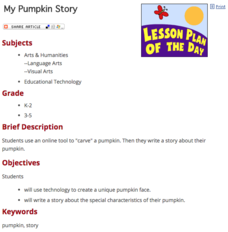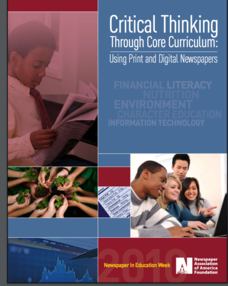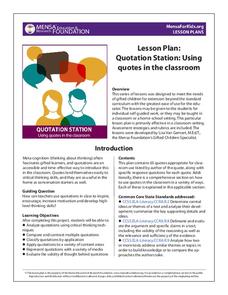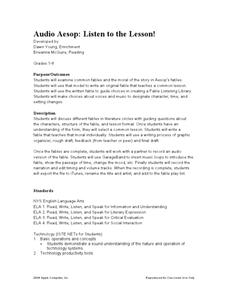Curated OER
Common Core Technology for K-5 Learners
K-5 teachers can blend fun and creativity into language arts curriculum when Common Core technology is involved.
Education World
My Pumpkin Story
Have young pumpkin carvers use technology to create a unique pumpkin face and write a short story about the special characteristics of their pumpkin.
Pearson
The Simple Present: Affirmative and Negative Statements
The present tense is a helpful skill to review in any language arts classroom. Focusing on statements made in the affirmative and in the negative, a slideshow presentation guides pupils through grammar rules and examples for the simple...
Newspaper Association of America
Critical Thinking through Core Curriculum: Using Print and Digital Newspapers
What is and what will be the role of newspapers in the future? Keeping this essential question in mind, class members use print, electronic, and/or web editions of newspapers, to investigate topics that include financial...
Pearson
Used To
Your class used to be confused about verb tenses, but now they understand more about the past tense! Practice the different ways to use used to in writing with a clear slideshow presentation, which includes negative and positive...
Curated OER
Telecommunications and the Whole Language Program
Young writers use technology and other media to research information on a chosen topic. They explore countries where keypals and e-mail friends are located. Using their writing skills, they correspond with their e-mail friend and...
Pearson
The Simple Past: Yes/No and WH- Questions
Were you in an accident? How did it happen? Pupils practice asking and answering questions with a language arts slideshow presentation. As they work on describing past events to explain a current condition, individuals take a look...
Lied Center of Kansas
The Ugly Duckling and The Tortoise and the Hare
Both The Ugly Duckling and The Tortoise and the Hare are great additions to an elementary language arts lesson. Young readers focus on the literary elements of each story, including characters and plot development, and apply...
MENSA Education & Research Foundation
Quotation Station: Using Quotes in the Classroom
An informative list compiled with quotes, authors, and discussion questions, along with 20 out-of-the-box application ideas, make up the collection of lessons geared to spark dialogue and creative thinking about quotations.
Curated OER
It's Raining Cats and Dogs! Literary Devices and Figurative Language
Third and fourth graders study literary devices and figurative language. They view a PowerPoint presentation (which you must create) to review hyperbole, idiom, simile, and metaphor. They read and discuss the book There's A Frog in...
Curated OER
Modern Day Pen Pals, Connecting Our Art Room to the Rest of the World!
Initiate an international pen pal program! After establishing communication with an art class in another country, groups share pod casts and video streams of their work. The scripted resource details how to prepare for the pod casts, but...
Media Smarts
Teaching TV: Television Techniques
As part of a five-activity unit on how television uses technology and film techniques to communicate meaning, elementary students create their own media productions that demonstrate their understanding of these concepts.
K12 Reader
Storytelling and Folklore
Stories are passed down orally in many cultures. Learn about the ways that storytelling can shape a society with a reading passage about Native American folklore and myths. After they finish reading, kids complete five reading...
Curated OER
Multimedia in the Language Arts Classroom
Multimedia lesson plans are a way for students to explore language arts in a creative way.
Curated OER
Audio Aesop: Listen to the Lesson!
Aesop's Fables are the focus of this language arts lesson plan. Young philosophers study and discuss the morals found in the most famous of Aesop's Fables. They write an original fable that teaches a common moral. A "Fable Listening...
Curated OER
Life Snapshots
Students create Inspiration webs using graphics or photographs that depict high and low points in their lives. This technology-based Language Arts lesson for the upper-elementary or middle-level classroom is excellent for improving...
Newspaper Association of America
Cereal Bowl Science and Other Investigations with the Newspaper
What do cereal, fog, and space shuttles have to do with newspapers? A collection of science investigations encourage critical thinking using connections to the various parts of the newspaper. Activities range from building origami seed...
Roald Dahl
Charlie and the Chocolate Factory
You can't read Roald Dahl's Charlie and the Chocolate Factory without craving the rich treats described in Dahl's vivid prose. Young writers try their hands at sensory language with a lesson plan that prompts them to write about...
Worksheet Web
Learning about Volcanoes
There's something about the classic volcano demonstration that can grab any learners' attention. Scholars begin with a reading and grand conversation about volcanoes, construct an erupting volcano using vinegar and baking soda, then...
Curated OER
What Does Art Sound Like?
Help your charges investigate visual art by identifying sounds that are associated with the images. They view art galleries online and discuss which sounds would be present if the image was a real life situation. Additionally, they...
Curated OER
"Sentences - Can You Make Them?"
Here is a great instructional activity on how to make a complete sentence. Young writers "drag and drop" the words using the mouse. This is a fantastic activity to use with "Word Wall Words." It provides practice in making sentences, as...
Curated OER
Using Rhythm Instruments to Tell a Story
After watching a video of Peter and the Wolf, and identifying the instruments used to represent each character, class members use rhythm instruments to represent the actions in the song, "What Would I do."
Curated OER
Elements of Art
Third graders discover elements in visual art. In this visual art instructional activity, 3rd graders explore the use of line, shape, and color in visual art. After reviewing works of art, students create unique art pieces. Technology...
Curated OER
Elaborating the Main Idea, Using Supporting Details
A desk is used as a visual analogy to construct the main idea and supporting details in a story. The top of the desk is the main idea, and each of the four legs provides supporting details. The legs of the desk provide support for the...























